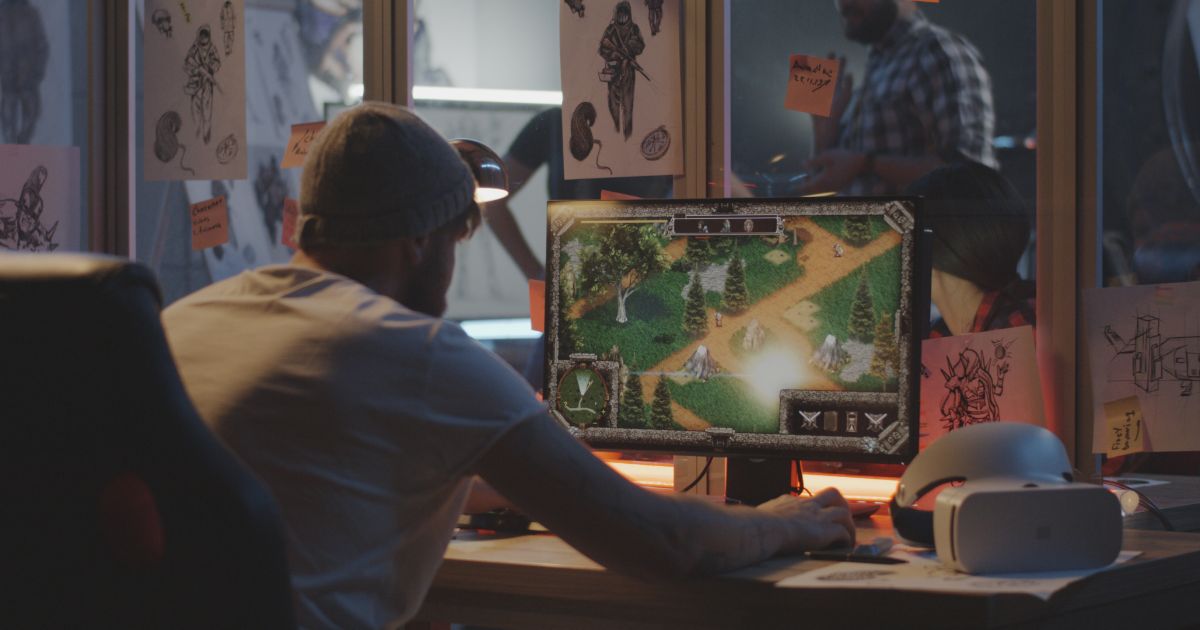How to Become a Game Tester with No Experience
Breaking into the gaming industry as a game tester without prior experience can seem like a daunting challenge. However, this role is an ideal entry point for anyone passionate about video games who dreams of being part of the creative process behind them. As a game tester, you'll identify bugs, glitches, and areas for improvement before they reach the eager hands of players worldwide.
Even without a background in game development or quality assurance, you can still start your journey in this exciting field. In this guide, we'll explore the steps you can take to become a game tester with no experience.
Step 1 - Understand the Role of Game Tester

Game testers, also known as quality assurance (QA) testers have the main task is video games meet the desired quality standards before they are released to the public. Here are some key aspects of the game tester's role that you need to understand:
Identifying Bugs and Glitches
Game testers play the game repeatedly and use different strategies to find any errors that could impact gameplay, graphics, sound, or functionality. Testers must meticulously document each issue they encounter, comprising steps to reproduce the problem and its impact on the overall gaming experience. This documentation is sent to developers to fix the issues effectively.
Evaluating Game Performance
Game testers are responsible for assessing frame rates, loading times, and responsiveness across various devices or platforms. The final game must perform smoothly under different conditions, such as varying internet speeds, hardware specifications, and screen sizes.
Assessing Game Balance and Usability
Beyond technical issues, game testers also evaluate the balance and usability of the game. They analyze the difficulty level, progression, and fairness to ensure that players have an enjoyable experience.
Step 2 - Build Your Knowledge
While having a deep passion for gaming is a great start, developing a thorough understanding of the technical and analytical aspects of game testing is essential. Here are some key steps and resources to help you set yourself on the path to becoming a game tester:
Understand the Game Development Process
Before diving into game testing, you should understand the broader context of game development. Familiarize yourself with the various stages of game production, from concept and design to development, testing, and release. Knowing the workflow and challenges developers face, you can easily communicate effectively with the team to provide more relevant feedback during the testing phase.
Books to Read:
"The Art of Game Design: A Book of Lenses" by Jesse Schell.
"Blood, Sweat, and Pixels: The Triumphant, Turbulent Stories Behind How Video Games Are Made" by Jason Schreier.
"Level Up! The Guide to Great Video Game Design" by Scott Rogers.
These resources can provide you with insights into the intricacies of game development, enhancing your ability to test games.
Learn Software Testing Principles
You ought to learn about different types of testing, such as functional testing, usability testing, performance testing, and regression testing.
Books to Read:
"Software Testing: Principles and Practices" by Srinivasan Desikan and Gopalaswamy Ramesh.
"Effective Software Testing: 50 Specific Ways to Improve Your Testing" by Elfriede Dustin.
"Testing Computer Software" by Cem Kaner, Jack Falk, and Hung Quoc Nguyen.
Get Familiar with Bug-Tracking Tools
Bug-tracking tools aid testers create detailed reports, tracking the status of bugs, and collaborate with development teams.
Popular Bug-Tracking Tools:
JIRA: Widely used for tracking bugs and managing projects in software development.
Bugzilla: An open-source bug-tracking tool that offers a comprehensive feature set for managing issues.
Mantis Bug Tracker: A simple and user-friendly tool for tracking and managing bugs.
Step 3 - Develop Relevant Skills

Here are the key skills to practice as you prepare for a career in game testing:
Analytical Thinking and Problem-Solving
Testers need to approach games with a critical mindset, dissecting gameplay mechanics, identifying issues, and thinking logically about how to resolve them.
Analytical thinking and problem-solving can be refined through various exercises.
Practice Puzzles and Logic Games: Engage in games like Sudoku, Rubik's Cube, or The Witness to develop your problem-solving abilities.
Review Games Critically: Write detailed reviews of the games you play, analyzing game mechanics, design, and user experience.
Attention to Detail
Game testers must identify even the smallest bugs and inconsistencies that could affect gameplay. Testers must thoroughly examine every aspect of a game to ensure no issues are overlooked.
It is fostering a keen eye for detail to recognize potential issues that may not be immediately apparent, contributing to a more polished final product.
Time Management and Organization
Game testers often work on multiple projects simultaneously, so they sharpen their time management and organizational skills to meet deadlines with deliver quality work.
Strategies for Improving Time Management:
Create a Testing Schedule: Organize your testing tasks and allocate specific time slots for each aspect of testing.
Set Priorities: Identify the most critical tasks and focus on them first to meet deadlines effectively.
Use Productivity Tools: Utilize tools like Trello or Asana to manage tasks and track progress.
Adaptability and Flexibility
The gaming industry is fast-paced, and now it's ever-evolving, requiring testers to be flexible in their approach. Testers must be open to learning new tools, testing methodologies, and adapting to changes in game development processes.
Passion for Gaming
A genuine passion for gaming is a valuable asset for any game tester. Enthusiasm for playing and analyzing games can fuel your dedication, driving you to excel in your role.
Step 4 - Play Games Critically
When playing a game critically, you should find the answer to the question of gameplay mechanics—are they intuitive and responsive? Also, evaluate the user interface (UI) for ease of use and clarity. Look for any visual glitches or inconsistencies in the graphics and art style.
Additionally, listen carefully for any audio issues, such as glitches or imbalances in sound and music. These observations point out potential areas for improvement and provide valuable feedback to developers.
Keep an eye on the game's frame rate, and note any drops or stuttering, which can affect the player's experience. Let your customers completely enjoy playing video games. Be vigilant for any instances where the game crashes or freezes, and try to determine the conditions that caused these issues. Understanding the game's performance builds a smooth player experience.
Step 5 - Create a Portfolio Game Tester
A well-crafted portfolio showcases your skills, experience, and dedication to potential employers. Here's how you can build an impressive portfolio:
Documenting Your Testing Experience
Start by documenting any relevant experience you have, even if it's informal. You can expose beta testing for indie games, participate in game jams, or provide feedback on games during early access phases. Remember to fully describe the specific roles you played, such as identifying bugs, suggesting improvements, or writing test cases.
Writing Detailed Game Analyses
Writing detailed analyses of games you've played can demonstrate your critical thinking and analytical skills. Choose a few games, then write comprehensive reports that cover various aspects - gameplay mechanics, graphics, UI, and story. Discuss any bugs or issues you encountered and how you think they could be fixed. These analyses can be presented as blog posts, articles, or detailed documents within your portfolio.
Showcasing Your Skills and Knowledge
Let's show employers your understanding of game development processes, familiarity with different gaming platforms, and any technical skills, such as basic programming or experience with bug-tracking tools. If you've taken any courses or certifications in game testing or quality assurance, be sure to include these as well.
Keeping Your Portfolio Updated
A good portfolio is always evolving. As you gain more experience or learn new skills, update your portfolio to reflect this. Regularly adding new analyses, reports, or experiences shows that you are actively engaged in your field and continuously improving.
Step 6 - Gain Experience of Game Tester

One of the most accessible ways to gain experience is by participating in beta testing programs. Many game developers release beta versions of their games to gather feedback from real players. You can test games in various stages of development, from early alpha to public beta. Websites like BetaTesting, BetaBound, and Centercode frequently list opportunities to join beta tests.
Game jams are events where developers, artists, and testers collaborate to create a game within a short time frame, often a weekend. Websites like itch.io and Game Jolt often host game jams, and platforms like Global Game Jam provide in-person and virtual participation opportunities.
Once you have some experience, consider applying for entry-level QA tester positions. Many companies offer junior or trainee positions that require little to no prior professional experience. Tailor your resume and cover letter to highlight the experience you've gained through beta testing, volunteering, game jams, and other activities. Even if the position is temporary or part-time, it can provide a stepping stone to more advanced roles.
Step 7 - Be Persistent
The gaming industry can be competitive, and success often requires patience, determination, and a willingness to learn and adapt.
Facing Rejections and Setbacks
Rejections are a common part of any job search, especially in competitive fields like game testing. We want to tell you that these setbacks do not reflect your abilities or potential. Each rejection is an opportunity to learn and improve. Review any feedback you receive, reflect on your application materials, and consider how you can strengthen your resume, cover letter, or interview skills.
Continuously Improving Your Skills
The gaming industry evolves rapidly, with new technologies, platforms, and testing methodologies emerging frequently. Continuously refining your skills—learning new testing tools, understanding different video game tests, or developing technical skills—will make you a more attractive candidate.
Skilltrans presents a selection of related courses to help you deepen your understanding of this topic. Please click on the course name below to learn more:
Unity Space Shooter Game Development tutorial using C#
In this course, you will how to make a space shooter game in unity. This course is an extension of old Space shooter video tutorials by unity officials. This course is using totally new features and coding practices and is compatible to work with all the newer versions of unity.
Learn how to create Space shooter video games using Unity, the world-leading free-to-use game development tool. With our online tutorials, you'll be amazed at how easy it is to create a game as such.
All the course project files from most of the Episodes are attached with the videos so that you can practice along.
You will get full lifetime access for a single one-off fee. You will learn to create a 3D space shooter game and all the resources will be provided to you.
Unity Mobile Game - Master Hyper Casual Word Game Mechanics!
In this course, You will learn how to
Create a Keyboard Input
Add the Word Containers to display the word entered by the player
Manage the Player Input
Checking the word entered with some simple algorithms
Smash Bugs !
Colorize the Letters
Colorize the keyboard
Set the Secret Word From a Large Dictionnary
Add a Keyboard Hint System
And a Letter Hint System
And More ! [ Including a Shader Graph mini Lesson ]
Simple Inventory System - Unreal Engine 5 Multiplayer (2024)
Make a simple inventory system from start to finish in Unreal Engine 5 multiplayer. The inventory made in this course is a multiplayer RPG inventory system similar to Zelda, Maplestory, and Minecraft. We will do that without writing a single line of code thanks to Unreal Engine Blueprint.
This Unreal Engine course requires no previous game development experience. I will guide you through the process step-by-step. Creating an inventory system is crucial in almost every game. It is crucial to know how to set up an easy inventory system as an Unreal Engine developer, as it is a common feature in almost every game.
Conclusion
Breaking into the gaming industry as a game tester might seem daunting, but with dedication and the right approach, it's achievable. Remember, experience is valuable, but it's not everything. Your passion for gaming, combined with a strong understanding of the role, can set you apart. By following these steps and continuously honing your skills, you can increase your chances of landing that first game-testing job and embarking on an exciting career in the gaming industry. Good luck on your journey!
By registering for Skilltrans's course, you can turn your passion for gaming into a fulfilling profession. Let's join us now!

Meet Hoang Duyen, an experienced SEO Specialist with a proven track record in driving organic growth and boosting online visibility. She has honed her skills in keyword research, on-page optimization, and technical SEO. Her expertise lies in crafting data-driven strategies that not only improve search engine rankings but also deliver tangible results for businesses.



